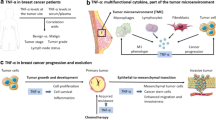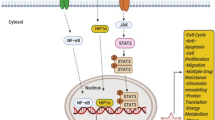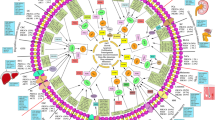Abstract
Platelet-derived growth factor-D (PDGF-D) has been linked with several human malignancies; however, its role in breast cancer progression is not known. We found that PDGF-D expressing breast cancer cell lines MDA-MB-231 and SUM-149 are more invasive compared to cell lines with little or no expression of PDGF-D such as MDA-MB-468 and MCF-7 cells. Over-expression of PDGF-D in PDGF-D low expressing MDA-MB-468 and MCF-7 cells by cDNA transfection showed increased cell proliferation while silencing the expression of PDGF-D by siRNA in PDGF-D high expressing MDA-MB-231 and SUM-149 cells showed decreased cell proliferation and increased apoptosis. Moreover, PDGF-D over-expression was positively correlated with the expression of Notch-1 and Jagged-1, and the expression of mesenchymal markers (Vimentin and ZEB-2) with concomitant decreased expression of epithelial marker E-cadherin. Since NF-κB activation plays a crucial role in Notch signaling as well as in epithelial–mesenchymal transition and tumor aggressiveness, we determined the DNA binding activity of NF-κB and our findings are consistent showing that PDGF-D over-expression led to increased DNA binding activity of NF-κB while it was found to be decreased by inactivation of PDGF-D. These results were also consistent with the expression and activity of MMP-9 and VEGF, as well as invasive characteristics. Further, forced expression of Notch-1/Jagged-1 by cDNA transfection de-repressed the effects of PDGF-D silencing on NF-κB activity and invasion. From these results, we conclude that PDGF-D plays an important role in breast tumor aggressiveness and this process is mechanistically linked with the activation of Notch and NF-κB signaling.






Similar content being viewed by others
References
Wang Z, Kong D, Li Y, Sarkar FH (2009) PDGF-D signaling: a novel target in cancer therapy. Curr Drug Targets 10:38–41
Li X, Eriksson U (2003) Novel PDGF family members: PDGF-C and PDGF-D. Cytokine Growth Factor Rev 14:91–98
LaRochelle WJ, Jeffers M, Corvalan JR, Jia XC, Feng X, Vanegas S, Vickroy JD, Yang XD, Chen F, Gazit G, Mayotte J, Macaluso J, Rittman B, Wu F, Dhanabal M, Herrmann J, Lichenstein HS (2002) Platelet-derived growth factor D: tumorigenicity in mice and dysregulated expression in human cancer. Cancer Res 62:2468–2473
Lokker NA, Sullivan CM, Hollenbach SJ, Israel MA, Giese NA (2002) Platelet-derived growth factor (PDGF) autocrine signaling regulates survival and mitogenic pathways in glioblastoma cells: evidence that the novel PDGF-C and PDGF-D ligands may play a role in the development of brain tumors. Cancer Res 62:3729–3735
Ustach CV, Taube ME, Hurst NJ Jr, Bhagat S, Bonfil RD, Cher ML, Schuger L, Kim HR (2004) A potential oncogenic activity of platelet-derived growth factor d in prostate cancer progression. Cancer Res 64:1722–1729
Xu L, Tong R, Cochran DM, Jain RK (2005) Blocking platelet-derived growth factor-D/platelet-derived growth factor receptor beta signaling inhibits human renal cell carcinoma progression in an orthotopic mouse model. Cancer Res 65:5711–5719
Ustach CV, Kim HR (2005) Platelet-derived growth factor D is activated by urokinase plasminogen activator in prostate carcinoma cells. Mol Cell Biol 25:6279–6288
Wang Z, Kong D, Banerjee S, Li Y, Adsay NV, Abbruzzese J, Sarkar FH (2007) Down-regulation of platelet-derived growth factor-D inhibits cell growth and angiogenesis through inactivation of Notch-1 and nuclear factor-kappaB signaling. Cancer Res 67:11377–11385
Zhao L, Zhang C, Liao G, Long J (2010) RNAi-mediated inhibition of PDGF-D leads to decreased cell growth, invasion and angiogenesis in the SGC-7901 gastric cancer xenograft model. Cancer Biol Ther 9:42–48
Jechlinger M, Sommer A, Moriggl R, Seither P, Kraut N, Capodiecci P, Donovan M, Cordon-Cardo C, Beug H, Grunert S (2006) Autocrine PDGFR signaling promotes mammary cancer metastasis. J Clin Invest 116:1561–1570
Lev DC, Kim SJ, Onn A, Stone V, Nam DH, Yazici S, Fidler IJ, Price JE (2005) Inhibition of platelet-derived growth factor receptor signaling restricts the growth of human breast cancer in the bone of nude mice. Clin Cancer Res 11:306–314
Wang Z, Li Y, Kong D, Banerjee S, Ahmad A, Azmi AS, Ali S, Abbruzzese JL, Gallick GE, Sarkar FH (2009) Acquisition of epithelial-mesenchymal transition phenotype of gemcitabine-resistant pancreatic cancer cells is linked with activation of the notch signaling pathway. Cancer Res 69:2400–2407
Kong D, Wang Z, Sarkar SH, Li Y, Banerjee S, Saliganan A, Kim HR, Cher ML, Sarkar FH (2008) Platelet-derived growth factor-D overexpression contributes to epithelial-mesenchymal transition of PC3 prostate cancer cells. Stem Cells 26:1425–1435
Naugler WE, Karin M (2008) NF-kappaB and cancer-identifying targets and mechanisms. Curr Opin Genet Dev 18:19–26
Ahmad A, Wang Z, Kong D, Ali S, Li Y, Banerjee S, Ali R, Sarkar FH (2009) FoxM1 down-regulation leads to inhibition of proliferation, migration and invasion of breast cancer cells through the modulation of extra-cellular matrix degrading factors. Breast Cancer Res Treat. doi:10.1007/s10549-009-0572-1
Ahmad A, Banerjee S, Wang Z, Kong D, Sarkar FH (2008) Plumbagin-induced apoptosis of human breast cancer cells is mediated by inactivation of NF-kappaB and Bcl-2. J Cell Biochem 105:1461–1471
Ahmad A, Kong D, Wang Z, Sarkar SH, Banerjee S, Sarkar FH (2009) Down-regulation of uPA and uPAR by 3, 3′-diindolylmethane contributes to the inhibition of cell growth and migration of breast cancer cells. J Cell Biochem 108:916–925
Ahmad A, Wang Z, Ali R, Maitah MY, Kong D, Banerjee S, Padhye S, Sarkar FH (2010) Apoptosis-inducing effect of garcinol is mediated by NF-kappaB signaling in breast cancer cells. J Cell Biochem (in press). doi:10.1002/jcb.22492, PMID 20108249
Li H, Fredriksson L, Li X, Eriksson U (2003) PDGF-D is a potent transforming and angiogenic growth factor. Oncogene 22:1501–1510
Bongarzone ER, Byravan S, Givogri MI, Schonmann V, Campagnoni AT (2000) Platelet-derived growth factor and basic fibroblast growth factor regulate cell proliferation and the expression of notch-1 receptor in a new oligodendrocyte cell line. J Neurosci Res 62:319–328
Romashkova JA, Makarov SS (1999) NF-kappaB is a target of AKT in anti-apoptotic PDGF signalling. Nature 401:86–90
Jemal A, Siegel R, Ward E, Hao Y, Xu J, Thun MJ (2009) Cancer statistics, 2009. CA Cancer J Clin 59:225–249
Thiery JP, Acloque H, Huang RY, Nieto MA (2009) Epithelial-mesenchymal transitions in development and disease. Cell 139:871–890
LaRochelle WJ, Jeffers M, McDonald WF, Chillakuru RA, Giese NA, Lokker NA, Sullivan C, Boldog FL, Yang M, Vernet C, Burgess CE, Fernandes E, Deegler LL, Rittman B, Shimkets J, Shimkets RA, Rothberg JM, Lichenstein HS (2001) PDGF-D, a new protease-activated growth factor. Nat Cell Biol 3:517–521
Bergsten E, Uutela M, Li X, Pietras K, Ostman A, Heldin CH, Alitalo K, Eriksson U (2001) PDGF-D is a specific, protease-activated ligand for the PDGF beta-receptor. Nat Cell Biol 3:512–516
Paulsson J, Sjoblom T, Micke P, Ponten F, Landberg G, Heldin CH, Bergh J, Brennan DJ, Jirstrom K, Ostman A (2009) Prognostic significance of stromal platelet-derived growth factor beta-receptor expression in human breast cancer. Am J Pathol 175:334–341
Vrekoussis T, Stathopoulos EN, Kafousi M, Navrozoglou I, Zoras O (2007) Expression of endothelial PDGF receptors alpha and beta in breast cancer: up-regulation of endothelial PDGF receptor beta. Oncol Rep 17:1115–1119
Meng Q, Qi M, Chen DZ, Yuan R, Goldberg ID, Rosen EM, Auborn K, Fan S (2000) Suppression of breast cancer invasion and migration by indole-3-carbinol: associated with up-regulation of BRCA1 and E-cadherin/catenin complexes. J Mol Med 78:155–165
Wang C, Navab R, Iakovlev V, Leng Y, Zhang J, Tsao MS, Siminovitch K, McCready DR, Done SJ (2007) Abelson interactor protein-1 positively regulates breast cancer cell proliferation, migration, and invasion. Mol Cancer Res 5:1031–1039
Naik MU, Naik TU, Suckow AT, Duncan MK, Naik UP (2008) Attenuation of junctional adhesion molecule-A is a contributing factor for breast cancer cell invasion. Cancer Res 68:2194–2203
Wang Z, Li Y, Kong D, Sarkar FH (2009) The role of notch signaling pathway in epithelial-mesenchymal transition (EMT) during development and tumor aggressiveness. Curr Drug Targets. doi:10.2174/138921020041844501
Kong D, Li Y, Wang Z, Banerjee S, Ahmad A, Kim HR, Sarkar FH (2009) miR-200 regulates PDGF-D-mediated epithelial-mesenchymal transition, adhesion, and invasion of prostate cancer cells. Stem Cells 27:1712–1721
Wang Z, Banerjee S, Li Y, Rahman KM, Zhang Y, Sarkar FH (2006) Down-regulation of notch-1 inhibits invasion by inactivation of nuclear factor-kappaB, vascular endothelial growth factor, and matrix metalloproteinase-9 in pancreatic cancer cells. Cancer Res 66:2778–2784
Sarkar FH, Li Y, Wang Z, Kong D (2008) NF-kappaB signaling pathway and its therapeutic implications in human diseases. Int Rev Immunol 27:293–319
Author information
Authors and Affiliations
Corresponding author
Additional information
The paper is retracted at the request of the publisher because blots of figures 3c and 5a were manipulated and compiled from different films without explanation.
An erratum to this article is available at http://dx.doi.org/10.1007/s10549-016-3905-x.
About this article
Cite this article
Ahmad, A., Wang, Z., Kong, D. et al. RETRACTED ARTICLE: Platelet-derived growth factor-D contributes to aggressiveness of breast cancer cells by up-regulating Notch and NF-κB signaling pathways. Breast Cancer Res Treat 126, 15–25 (2011). https://doi.org/10.1007/s10549-010-0883-2
Received:
Accepted:
Published:
Issue Date:
DOI: https://doi.org/10.1007/s10549-010-0883-2




